- Home
- Jason Pinter
The Mark Page 12
The Mark Read online
Page 12
“The kids need to be able to reach me. I don’t want to hide. I don’t want to upset their lives any more than they already have been.”
“The kids’ll be fine, Lin. You need to take care of yourself.” He heard a wistful laugh on the other end. Then Linda began to sob. Joe felt his cheeks go flush as his sister wept for her lost husband.
“Linda?” he said, his chest contracting, hot tears filling up his eyes. “Lin, please talk to me.” She blew her nose, a pitiful rattle.
“Funny,” Linda said. “It was always John who said he’d take care of me. He never said anything about me taking care of myself. I guess I just believed he’d always be there, and I wouldn’t have to worry. Why’d he have to leave me? Jesus, Joe. I loved him so much.”
Mauser felt a tear slide down his cheek, sobs racking his throat.
“I know you did, Lin. I did, too. I know it’s no consolation, but I’ll be there for you. Now and always.”
“Thanks, Joe. I know you will.”
“You want me to come over?”
“No,” she said with an air of finality. “I need to be alone right now. I know that sounds selfish since he was your family, too—but I need this. Do you understand? Please tell me you do.” Mauser said he did.
“Can I do anything for you? Bring you anything?”
“You can do one thing for me,” Linda said. Mauser felt a chill run down his spine.
“Name it.”
“I want you to kill the man who killed my husband. I don’t care what it takes, Joe. You find him and you fucking cut his head off.”
“Lin…”
“I know, I know,” she said. “Thanks for calling, Joe.”
“I’ll talk to you soon.”
“I love you.”
The words leaked from his mouth like a balloon’s final gasp of air. “I love you, too.”
Mauser put the receiver down. He dropped his head into his hands as convulsions of sadness and rage seized his body. When Joe looked up, his vision was streaked, his eyes burned.
For Linda, he thought.
For me.
17
T he Ringer sat baking in his car, going over the conversation in his head. He’d just spoken with the Arab deli owner, confirming that the man had, in fact, seen and scared off Henry Parker that morning.
“Just picked up my bat,” the man said, smacking the wooden mallet against his palm. The Ringer held his hands up in mock surrender. “And the cocksucker ran outta here lickety-split. You know one of the greatest things about this country is baseball. This Parker fellow probably saw it in my eyes. If I was born here I woulda made the majors. I would’ve thumped him a good one.”
The Ringer placated the man for a minute, then returned to his car. He tuned the radio into 1010 WINS, where a rumor was circulating that the cops had found Parker—and lost him—in the area nearby Columbia’s campus.
Mya Loverne. The cops were all over her by now. Why had Parker gone uptown and risked capture? There had to be a reason besides the girl. He was resourceful. There had to be another angle.
Parker was born with a pedigree that had been run over by a Mack truck, but still managed to work himself into an Ivy League school, pulled good grades and landed a job at one of the country’s most respected newspapers. He was a pull-yourself-up-by-the-bootstraps archetype. The Ringer hated them, hated chasing them. If forced into self-reliance early on in life, one’s abilities in that regard would only mature with age. Knowing this, it was probable Parker had fled the city and the cops were searching for a needle in an empty haystack. That boded well. At least he was on equal footing with the cops.
He opened his notebook and wrote down every conceivable route out of New York he could think of. He crossed off the airports and bus terminals. It was impossible for Parker to get past security. Subways were a problem, but they could only take him within the five boroughs. From what DiForio and Blanket said, Parker had no reliable contacts in New York other than his employer and girlfriend.
His employer was Wallace Langston, editor in chief of the New York Gazette. The same paper that had, reluctantly, he was sure, run a front-page story about John Fredrickson’s murder that morning. In a letter from the editor, Langston himself referred to Parker as a “young employee who’d met their hiring expectations with flying colors and had exhibited no hostile, let alone homicidal, tendencies,” then adding, “The Gazette will do anything and everything possible to bring all the facts to light, without any bias or prejudice.”
If Langston made any attempt to aid Parker, his paper would be in jeopardy. The Ringer knew these newsmen. Most of them considered themselves noble, even altruistic, but in truth they lusted for fame, the glory of the byline. Hungry writers were no doubt chomping at the bit to write the Henry Parker/John Fredrickson story. Betraying friendships for the sake of notoriety.
Columbia. It didn’t add up.
The Ringer picked up the phone and dialed Information, asking to be connected to the Columbia University directory. A sweet lady, her voice young and slightly timid, answered the phone. The Ringer asked to be connected to whatever office handled student transportation.
This time, a gruff man, sounding like he hadn’t trimmed his beard in several months, answered.
“Hi, my name is Peter Millington,” the Ringer said. “And I’m thinking about coming to Columbia for grad school. I live in California and I was wondering if you could tell me what forms of transportation there are for students on campus.”
“Well,” the operator said, “you got JFK and LaGuardia a cab ride or subway trip away….”
“No good, my family won’t pay for the airline tickets. What are the cheap ways if you need to go a long distance off campus?”
“There’s plenty of buses, trains. You got Port Authority and Penn Station…”
“Anything else?”
“Well, if you’re going cheap, there’re the student shuttles.”
“Student shuttles.” A bell went off in the Ringer’s head. “If I wanted to learn more, maybe talk to a student about these shuttles, how would I do that?”
“One moment, let me transfer you to someone who can help.”
As he waited for the call to go through, the Ringer penciled three schools down on his list: Columbia, which was doubtful. Small chance Parker would hang around uptown, waiting to be snatched by a black-and-white. Hunter and NYU had higher probabilities. And both were right off the 6 train.
Finally he was connected to the Office of Student Services. Under the guise of Lennie Hardwick, sophomore and racked for time, he persuaded a very nice lady named Helen to check the student shuttle postings for him. One match came up, a junior named Wilbur Hewes who was driving home to Ontario at 11:00 a.m. this morning. No other rides were registered for today. Hitching a ride to Canada made sense—assuming Parker didn’t get stopped at the border. The Ringer wrote down Hewes’s name and asked for the phone number on the posting. Lennie figured he’d keep it in case he ever wanted to do some fishing up north.
The Ringer called Wilbur Hewes’s cell phone, got a curt response on the third ring.
“Yeah?”
“Hello, is this Wilbur?”
“Yeah, what?” The Ringer could hear the rush of the highway, Wilbur’s voice full of static. Horns blaring. Heavy metal music loud enough to make his eardrums throb. The Ringer smiled. Wilbur was stuck in traffic.
“Hi, Wilbur, my name is Oliver Parker. I’m calling from Montreal, and I was informed by the helpful operator at Columbia that my son Henry might have gotten a ride from you.”
“No Henry here. Nobody responded to my posting.”
“Really?” the Ringer said, crossing Columbia off the list. “You sure he didn’t tell you to keep it a secret? It’s my birthday today, maybe he wanted to surprise me and show up unannounced?”
“Listen, man,” Wilbur said. The Ringer could hear the agitation of bumper-to-bumper traffic getting to Wilbur. “Nobody called about a ride. Unless your son’s h
iding in my trunk, wedged between three big-ass suitcases, he’s not with me. All right?”
“Absolutely. I’m sorry to bother you.” Wilbur hung up.
After a quick call to Hunter, he learned the school did not offer such a service, at least not one that was officially sanctioned. In other words, without a contact at the school, he was out of luck. He crossed Hunter off the list.
He phoned NYU and was connected to the Office of Student Activities.
The OSA receptionist, a bitter-sounding battle-ax of a woman, said she wasn’t allowed to offer the listings over the phone. He asked her for the address and hung up.
Traffic moved like oil through a funnel, slow and thick. He double-parked in front of the OSA and, inside, a helpful custodian directed him to the postings. Halfway down the light blue hallway, the Ringer found what he was looking for.
The portly woman seated behind a pane of glass was clearly the same person who’d refused to read him the listings over the phone. He offered a pleasant smile and picked up the listings. They were separated into two batches: red and blue. He licked his thumb and sifted through them. No dice. No cars were scheduled to leave until later in the week.
He was about to cross NYU off his list when, on a whim, he walked up to the receptionist and pulled out Henry Parker’s photo, cropped from the newspaper. He gently rapped on the glass. The woman, a glamorous mole poking from her left nostril like a burrowing hedgehog, was buried in a celebrity magazine.
“Sorry to bother you,” the Ringer said. “I was supposed to drive my son home this morning, but I’m not sure he got the message and I’m worried he might have left without me. He’s about six feet tall, brown hair. He might have had a backpack of some sort with him.”
The woman squinted, crinkled her nose and leaned closer.
“Yeah, there was one kid in here like that. He was in some kind of big huff, too, not very patient.” The Ringer’s heart quickened. “You ask me, your kid needs some lessons in manners.”
The Ringer nodded. “First thing I’ll tell him. Do you know if he got a ride from a student?”
“He did take a slip from the board. I can’t tell you what he did with it.”
“Would you happen to know whose slip he removed?”
The woman looked less than eager to help.
“Please,” the Ringer added, his eyes imploring. “His aunt is sick, emphysema. I really need to find him.”
“Doesn’t your boy have a cell phone?”
The Ringer offered a sheepish look. “No, his sister at George Washington has the only one in our family.”
The woman sighed heavily, then punched some keys on the computer.
“We log in all registered student rides. I can check the ones that left this morning, if it’s really that urgent. If it’s that urgent.”
“Believe me, it is.”
The woman hit a few more keys, waited a moment, punched a few more, then came up with a name.
“Amanda Davies,” she said. “Left at nine this morning to St. Louis.”
“You know, I’d love to call Ms. Davies up, let my boy know everything’s all right. Did Miss Davies leave a phone number?” The woman nodded, scribbled on a Post-it and handed it through the small slot at the bottom of the window.
“Anything else?” she said, her eyes darting back to pictures of a couple cavorting topless on a white beach.
The Ringer shook his head. “No, you’ve been extremely helpful. Thank you.”
As he left the OSA, the Ringer dialed the operator.
“What city and state?”
“St. Louis, Missouri. I’d like the address and phone number for a Miss Amanda Davies.”
Five minutes later the Ringer had reserved a plane ticket and called an associate in St. Louis who could get him an un-traceable gun. Ten minutes later he was speeding to LaGuardia airport. Blood was in the water, and he would only be circling for so long before he was able to strike.
18
I was back in that hallway. The man was pointing his gun at me. His horrible, manic grin breaking through the darkness. His finger squeezed the trigger. There was a sharp report and I was blinded by the gun’s muzzle. He squeezed again. And again. But with each successive blast, rather than the slug ripping through my body, tearing my flesh, John Fredrickson would stagger back. And another gaping wound would appear in his chest.
He looked at the pistol, as if wondering what went wrong, then fired again, his body jolting backward like a puppet yanked by a spiteful master. Every bullet meant for me instead struck him, blood spurting from his chest.
Once the clip was empty, Fredrickson stared at the gun, his jacket and shirt in gory tatters. He silently mouthed what happened, before collapsing onto the floor. When I looked down, the gun was gone from his hand. Then it appeared in mine.
Wake up, Henry.
Then I was back in the car with Amanda.
I blinked the sleep from my eyes. It was a dream. My neck had gone stiff. Apparently I’d fallen asleep against the window. My face felt sticky. The sky was dark. The dashboard clock read 8:52 p.m. Amanda was sipping a fresh cup of coffee. An unopened cup sat in the holder.
“I got you one, just in case,” she said. “It’s probably cold by now, but I didn’t want to wake you.”
“Thanks, I could use it.” I pulled back the tab and took a sip. It was cold, and heavy on the milk and sugar. Amanda Davies clearly valued the little things in life.
She gestured toward the cup. “I wasn’t sure how you liked it, but you seem like a light-and-sweet kind of guy.”
“And you’d be right,” I said. “So light and sweet…tell me, Sherlock, did you come to that conclusion based on the scientific evidence in your notebook?”
“No, but you look a little soggy around the tummy, I assumed you weren’t one to skimp on the sweet stuff.”
“Touché.”
Amanda gave a wry smile and turned back to the road.
I stretched my arms out, feeling my muscles slowly loosen. Drinking the coffee only made me realize just how hungry I was. And how badly I had to pee.
A billboard appeared up ahead, and Amanda steered toward it. The sign read St. Louis/Terre Haute.
“How far are we?”
“Three hours, give or take. Traffic’s not too bad, though some asshole cut me off a few miles back.”
Then I noticed the spiral notebook sitting on her lap, a pen tucked into the binding.
“Taking notes while I was sleeping?”
Amanda nodded as though there was nothing strange about it.
“We’re making good time,” she said absently. “You need to let me know where to drop you. Give me some lead time, would you?”
“Sure,” I said. My mind raced. At some point she’d realize I had nowhere to go, that nobody was waiting for me. An idea popped into my head. Feeble, but it just might work. Not like I had anything better.
“Actually,” I said, “since I missed the last few bathroom breaks, it’d be swell if we could swing by a rest stop.”
“No problem, Carl. First one I see.”
The name still sounded odd, my lies building up like mud in an hourglass.
Ten minutes later, we pulled into a rest area filled with SUVs and minivans. People with all the time in the world, and no pressure to use it. The parking lot was surrounded by thick rows of trees, the smell of car exhaust and burger grease thick in the air.
“Ah,” Amanda said, taking a deep breath. “I love the smell of lard in the evening.” She looked at my frozen countenance. “You know, Robert Duvall? Apocalypse Now?”
“I got the joke, sorry. My mind’s just somewhere else. Still waking up a bit.”
“You’re still tired? Must have had a hell of a night last night.”
“You might say that.”
“Well, I’m gonna grab some fries and a milk shake while you hit the little boys’ room.”
“I’ll come with you. I could use a French fry transfusion. Besides, it’s only fair th
at I pay.”
“You’re paying for half the gas, buddy. Better make sure you can afford some Exxon Supreme along with my cholesterol burger.” I laughed, quite forcibly, very aware that my cash supply was on life support.
As we walked toward the complex, anxiety began to tingle inside me, a sort of paranoid spider sense. I had forty dollars to my name and no immediate possibility of making more. I had no friends or family to turn to—or wanted to turn to. I looked at the girl walking beside me, wondering if she could sense any of this. Wondering what she’d do if she knew the truth.
Amanda went to the ladies’ room, and I set the unofficial world record for the longest urination in history. Of course I still made it out of the restroom before she did and went straight for Mickey D’s. I wasn’t a big fast-food person, but the smell of beef-injected French fries may as well have been filet mignon. A minute later Amanda joined me on line.
“Thanks for getting a spot,” she said. “You mind if we eat in the car?”
“Not at all. I actually need to talk to you.”
“About what?” she said, scanning the menu. “I can’t decide between a farmer’s salad or a double cheeseburger.”
“Let’s wait till we get back in the car.”
She shrugged. “Whatever.”
I bought a value meal and an extra order of fries. Amanda bought some newfangled salad that, being McDonald’s, probably still had the fat content of a jelly doughnut.
The first order of fries disappeared before we made it to the car, and by the time we pulled onto the highway all that remained of my meal were three lettuce molecules and a pile of dirty napkins.
“So are you gonna tell me where I’m dropping you? Or maybe I should just leave you at the first housing project I come to.” She smiled, and I returned a weak one.
“Actually, that’s what I wanted to talk to you about.” Amanda looked at me, concerned. “I don’t know how else to say this, but my aunt and uncle…I’m supposed to stay with them and, well, I called them while you were in the bathroom and they’re not back in town yet. They’re on vacation in Cancún and their flight got delayed until tomorrow.”

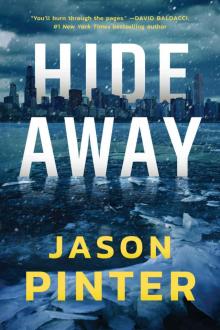 Hide Away (A Rachel Marin Thriller)
Hide Away (A Rachel Marin Thriller)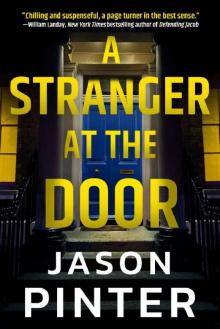 A Stranger at the Door (A Rachel Marin Thriller)
A Stranger at the Door (A Rachel Marin Thriller)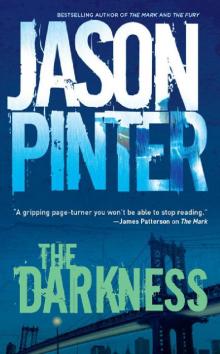 The Darkness hp-5
The Darkness hp-5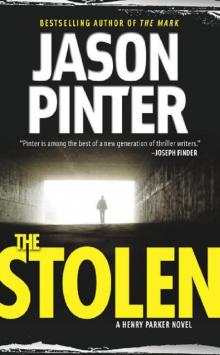 The Stolen hp-3
The Stolen hp-3 The Guilty hp-2
The Guilty hp-2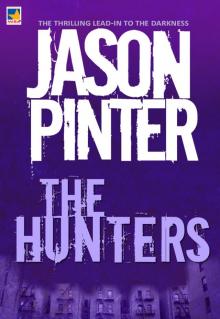 The Hunters
The Hunters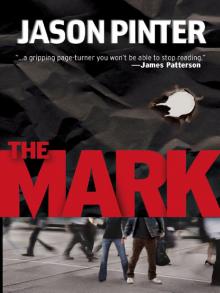 The Mark hp-1
The Mark hp-1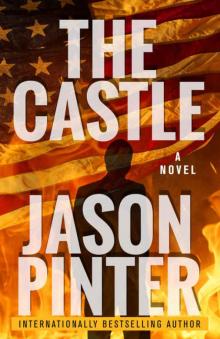 The Castle: A Ripped-From-The-Headlines Thriller
The Castle: A Ripped-From-The-Headlines Thriller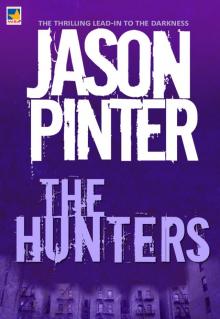 The Hunters (henry parker)
The Hunters (henry parker)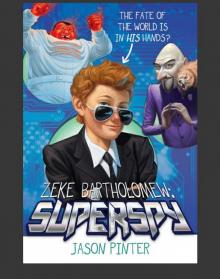 Zeke Bartholomew
Zeke Bartholomew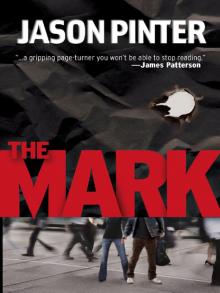 The Mark
The Mark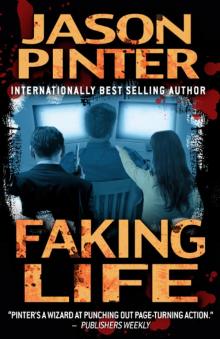 Faking Life
Faking Life![[Henry Parker 01.0] The Mark Read online](http://i1.bookreadfree.com/i2/04/08/henry_parker_01_0_the_mark_preview.jpg) [Henry Parker 01.0] The Mark
[Henry Parker 01.0] The Mark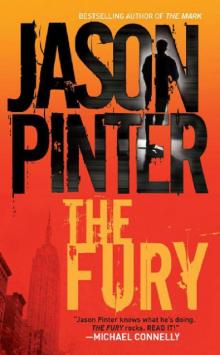 The Fury hp-4
The Fury hp-4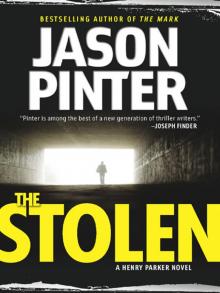 The Stolen
The Stolen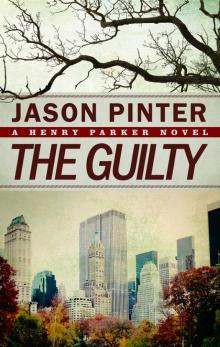 The Guilty
The Guilty